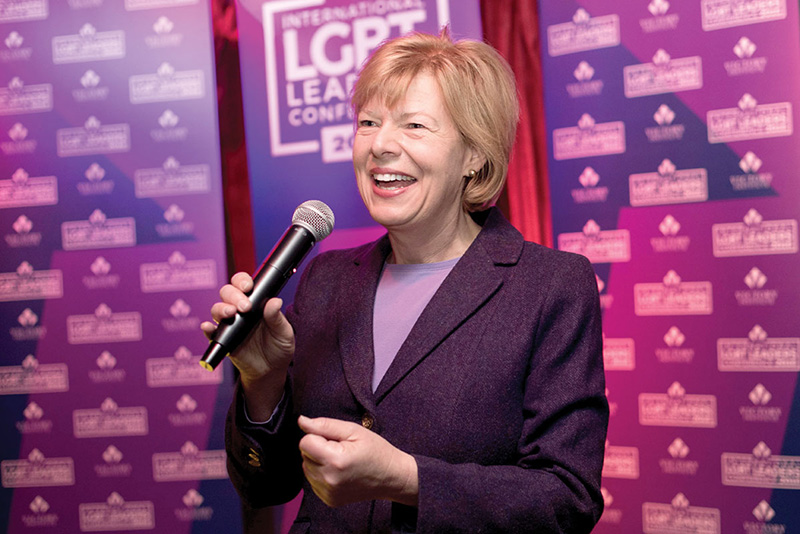Corporations Warn Anti-Gay Law Could Hurt Uganda’s Economy
A coalition of businesses is warning Uganda's president that signing an anti-LGBTQ law could negatively affect the country's economy.

A coalition of international companies warned that sweeping anti-LGBTQ legislation to be signed into law by Uganda’s president could harm the country’s economy and its ability to attract businesses.
The Open for Business coalition, dedicated to promoting LGBTQ inclusion in the workplace, said the legislation is dangerous. Its members include Google, Mastercard, Unilever, Standard Chartered, PwC, and Deloitte, all of which have operations in Uganda.
The bill is alarmingly broad in its provisions. While same-sex relations are already criminalized in Uganda, under the new law, anyone who admits to being LGBTQ or advocating for LGBTQ rights can be potentially imprisoned for life.
Individuals or institutions that support or fund LGBTQ-related groups or organizations, or those that publish or distribute information about homosexuality or portray LGBTQ people in a positive or neutral light — including media outlets — can be prosecuted and imprisoned for years.
Cisgender allies of the LGBTQ community can be prosecuted if they publicly express support for LGBTQ rights.
Family, friends, and even acquaintances of suspected LGBTQ people can be punished for failing to report instances of alleged homosexual behavior to police.
The bill imposes the death penalty for those found guilty of “aggravated homosexuality,” a term referring to people who engage in homosexual conduct with another person who cannot or does not consent, or is pressured into engaging in same-sex conduct.
After passing with overwhelming support from members of parliament, the measure is headed to President Yoweri Museveni for his signature into law.
Museveni has not yet commented on the bill, but signed a similar law, known as the “Kill the Gays” bill, which initially proposed the death penalty for LGBTQ people before being amended in 2014. A Ugandan court later overturned the law on procedural grounds.
Uganda also has a long history of anti-LGBTQ sentiment. This is, in part, due to its own unique history and colonial-era laws discouraging homosexuality, as well as the influence of Christian and Muslim religious revival movements that have spread propaganda and exploited societal discomfort with homosexuality, painting LGBTQ people as child abusers, lecherous predators, or a danger to the larger societal order.
Already, the 2023 legislation has drawn international condemnation, with many Western nations, including the United States, expressing their concerns over the bill. The White House previously called the bill one of the world’s most extreme pieces of anti-LGBTQ legislation.
According to Reuters, the Open for Business coalition has argued that the legislation would stifle investment in Uganda and drive away tourism.
It also said in a statement that the new law would undermine companies’ ability to recruit and retain diverse and talented employees.
“Discrimination against LGBTQ+ people has a detrimental effect on employees and runs counter to the interests of businesses and economic growth in Uganda,” the coalition said in a statement. “The evidence shows that policies designed to exclude minorities such as the LGBTQ+ community have a real cost — not only on people, but on business performance as well as national economic competitiveness.”
As evidence of the potential economic costs, the coalition cites a 2019 study showing that neighboring Kenya loses up to 1.7% of its gross domestic product annually due to its anti-LGBTQ policies.
Critics also note that the law would place LGBTQ-affirming companies in an impossible situation, effectively requiring them to “out” their own employees and report them to the police if they know that those workers identify as LGBTQ.
“Either they violate the law in Uganda, or they are going against international standards of corporate responsibility as well as human rights laws of the countries in which they are headquartered,” Yvonne Muthoni, the coalition’s country director, based in Kenya, told Reuters.
Support Metro Weekly’s Journalism
These are challenging times for news organizations. And yet it’s crucial we stay active and provide vital resources and information to both our local readers and the world. So won’t you please take a moment and consider supporting Metro Weekly with a membership? For as little as $5 a month, you can help ensure Metro Weekly magazine and MetroWeekly.com remain free, viable resources as we provide the best, most diverse, culturally-resonant LGBTQ coverage in both the D.C. region and around the world. Memberships come with exclusive perks and discounts, your own personal digital delivery of each week’s magazine (and an archive), access to our Member's Lounge when it launches this fall, and exclusive members-only items like Metro Weekly Membership Mugs and Tote Bags! Check out all our membership levels here and please join us today!




























You must be logged in to post a comment.